Educational Libraries
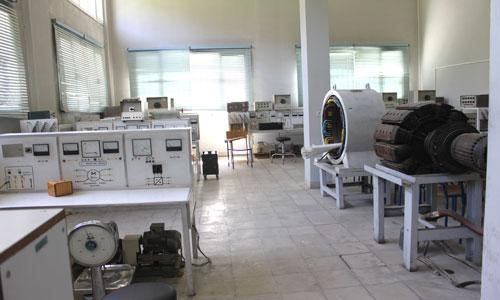
(Jabir-ibn-Hayyan building, room 108)
This laboratory is provided for all students and industrialists to test their theoretical knowledge in practice and acquire the necessary skills to apply, start and research in electric machines. The tests that are offered to students include a variety of tests related to three-phase and single-phase AC and DC motors and generators, as well as special machines. For example: synchronizing the generator with an infinite network, parallel connection of several synchronous generators as a local network, start-up tests, no-load, charged, etc. Short-term specialized projects and courses implemented in this laboratory include design, testing, troubleshooting, protection, installation, commissioning, drive and control of electric machines and electronic converters, testing of generator drive systems and insulation testing of high voltage electric machines.
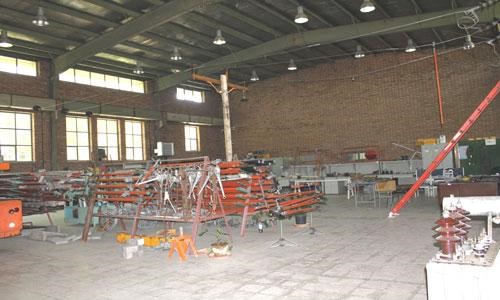
Hotline workshop
(Niches No. 1, Electrical Group)
The hotline is a transmission line in which electricity flows and repairs are carried out on it without shut-down the power grid. In the objectives of the electricity industry and customer satisfaction, selling more energy, helping to produce more in the industrial sector, preventing premature wear and tear of network equipment, due to frequent switches and reducing losses, are among the benefits of hotline repairs. In this workshop, technical experts and students are taught how to perform various types of repairs caused by various errors on the electrical network. In addition, the repairs on the electric network are done with a series of insulation devices in two ways: close control and remote control.
(Niches No. 1, Electrical Group)
The hotline is a transmission line in which electricity flows and repairs are carried out on it without shut-down the power grid. In the objectives of the electricity industry and customer satisfaction, selling more energy, helping to produce more in the industrial sector, preventing premature wear and tear of network equipment, due to frequent switches and reducing losses, are among the benefits of hotline repairs. In this workshop, technical experts and students are taught how to perform various types of repairs caused by various errors on the electrical network. In addition, the repairs on the electric network are done with a series of insulation devices in two ways: close control and remote control.
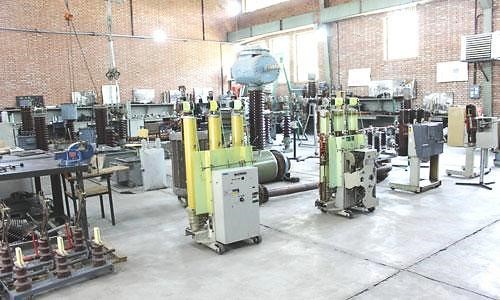
Substation components workshop
(Niches No. 2, Room 25)
As the main components of power systems, high-voltage substations play the role of connecting production, transmission and distribution systems. The correct use of these Substations can increase the reliability factor of the power network. In this regard, the specialized workshop of substation components is of special importance in advancing this goal, which provides specialized training related to the equipment used in HV, medium and distribution substations. In this workshop for students and industrialists, topics such as internal construction, operation, constituent components, correct operation methods, various standard tests and repairs of substation equipment such as power switches, sectionalizers, measuring and protection transformers, arresters, tap changers, surge arresters, etc., provide the necessary training in a theoretical and practical way.
(Niches No. 2, Room 25)
As the main components of power systems, high-voltage substations play the role of connecting production, transmission and distribution systems. The correct use of these Substations can increase the reliability factor of the power network. In this regard, the specialized workshop of substation components is of special importance in advancing this goal, which provides specialized training related to the equipment used in HV, medium and distribution substations. In this workshop for students and industrialists, topics such as internal construction, operation, constituent components, correct operation methods, various standard tests and repairs of substation equipment such as power switches, sectionalizers, measuring and protection transformers, arresters, tap changers, surge arresters, etc., provide the necessary training in a theoretical and practical way.
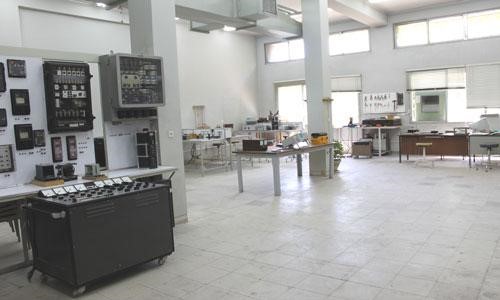
Relay and electrical protection laboratory
(Jabir-ibn-Hayyan building, room 108)
One of the important sectors in the electricity industry that requires high technical knowledge is network protection and electrical equipment. Therefore, practical familiarity with protective equipment and how to test and operate them, along with theoretical training, is of particular importance. The relay and protection laboratory of this university is one of the few well-equipped laboratories in this field, which operates for short and long-term specialized and educational courses and provides engineering services. The equipment of this laboratory includes all kinds of digital, static and mechanical relays, all kinds of tester devices and current and voltage measuring transformers.
(Jabir-ibn-Hayyan building, room 108)
One of the important sectors in the electricity industry that requires high technical knowledge is network protection and electrical equipment. Therefore, practical familiarity with protective equipment and how to test and operate them, along with theoretical training, is of particular importance. The relay and protection laboratory of this university is one of the few well-equipped laboratories in this field, which operates for short and long-term specialized and educational courses and provides engineering services. The equipment of this laboratory includes all kinds of digital, static and mechanical relays, all kinds of tester devices and current and voltage measuring transformers.
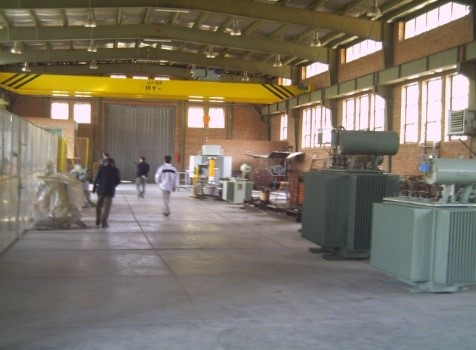
Transformer specialized workshop
(Niches No. 3, Room 46)
The transformer workshop started its activity in the field of repair and testing of distribution transformers since 1361. Due to the extensive needs and capabilities of this workshop, most regional power companies of the country, companies of the Ministry of Energy, and public and private companies use the specialized services of this workshop to repair and test their transformers. Considering the technical knowledge and equipment available in the workshop and the confidence that there is in the accuracy of the results of the tests conducted in this workshop, employers and buyers of transformers use the services of this workshop to perform routine tests and type tests of domestically manufactured transformers as well as imported transformers. Experiments in this workshop are carried out using calibrated equipment, specialized human resources and under the supervision of expert experts according to valid international standards.
(Niches No. 3, Room 46)
The transformer workshop started its activity in the field of repair and testing of distribution transformers since 1361. Due to the extensive needs and capabilities of this workshop, most regional power companies of the country, companies of the Ministry of Energy, and public and private companies use the specialized services of this workshop to repair and test their transformers. Considering the technical knowledge and equipment available in the workshop and the confidence that there is in the accuracy of the results of the tests conducted in this workshop, employers and buyers of transformers use the services of this workshop to perform routine tests and type tests of domestically manufactured transformers as well as imported transformers. Experiments in this workshop are carried out using calibrated equipment, specialized human resources and under the supervision of expert experts according to valid international standards.
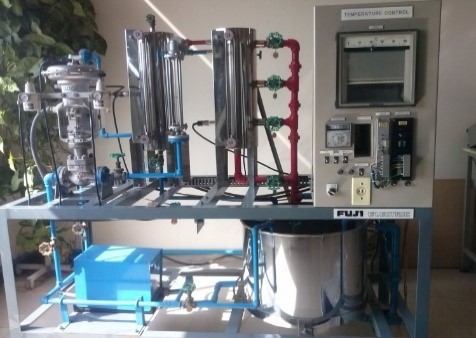
Industrial control laboratory
(Jabir-ibn-Hayyan building, room 247)
In this laboratory, several experimental sets have been provided using the industrial and standard equipment of the day and it introduces students to the methods of controlling the level, pressure, temperature and flow of fluids. Also, students can experience adjusting the coefficients of PID controllers on these industrial sets.
(Jabir-ibn-Hayyan building, room 247)
In this laboratory, several experimental sets have been provided using the industrial and standard equipment of the day and it introduces students to the methods of controlling the level, pressure, temperature and flow of fluids. Also, students can experience adjusting the coefficients of PID controllers on these industrial sets.
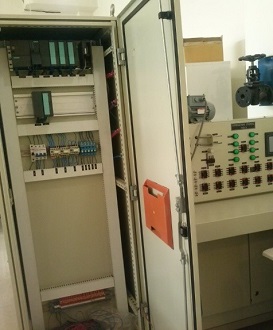
DCS laboratory
(Jabir-ibn-Hayyan building, room 247)
This laboratory is equipped based on DCS (Distributed Control System) of Siemens company type PCS7. Its control panels are industrial rittal type and the arrangement of the equipment inside it is done according to the industrial requirements. Its HMI is based on industrial computers and Wincc software, and the Hot Redundancy mode has been seen in PLC and industrial computers according to industrial conditions in the DCS of the mentioned laboratory. By using the available facilities, students can be introduced to all the real conditions in the industry, including start-up, decommissioning, operation, etc. in large industrial plants such as power plants, refineries, and petrochemicals. Also, by using the control facilities based on PLC S7-300 in the laboratory complex, it can be connected to the DCS as an island to evaluate different working modes.
(Jabir-ibn-Hayyan building, room 247)
This laboratory is equipped based on DCS (Distributed Control System) of Siemens company type PCS7. Its control panels are industrial rittal type and the arrangement of the equipment inside it is done according to the industrial requirements. Its HMI is based on industrial computers and Wincc software, and the Hot Redundancy mode has been seen in PLC and industrial computers according to industrial conditions in the DCS of the mentioned laboratory. By using the available facilities, students can be introduced to all the real conditions in the industry, including start-up, decommissioning, operation, etc. in large industrial plants such as power plants, refineries, and petrochemicals. Also, by using the control facilities based on PLC S7-300 in the laboratory complex, it can be connected to the DCS as an island to evaluate different working modes.
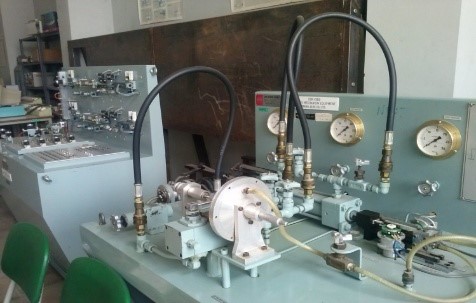
Hydraulic-pneumatic laboratory
(Jabir-ibn-Hayyan building, room 140)
Drives are one of the important components in control systems. Many actuators are hydraulic or pneumatic. In this laboratory, students work with hydraulic or pneumatic control circuits and get knowledge about their technical principles. In order to do practical work in the laboratory, students analyze control circuits using hydraulic simulator software.
(Jabir-ibn-Hayyan building, room 140)
Drives are one of the important components in control systems. Many actuators are hydraulic or pneumatic. In this laboratory, students work with hydraulic or pneumatic control circuits and get knowledge about their technical principles. In order to do practical work in the laboratory, students analyze control circuits using hydraulic simulator software.
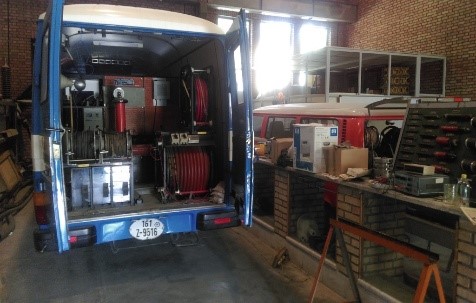
Cable fault diagnosis workshop
(Niches No. 1, Electrical Group)
This workshop started its activity in 1365 with modern equipment in the fields of education and engineering services and specialized courses in the university and outside the university in the country. It can be said that this workshop is the first troubleshooting workshop equipped with mobile diagnostic laboratory equipment vehicles in the country and has so far delivered many trainers in this field to the industry. This workshop has been active in two levels of ground distribution cables, HV and LV, regarding their troubleshooting, testing and commissioning, and has diagnosed and commissioned more than hundreds of cable circuits in every season. It has also participated in many construction projects of the Ministry of Industries, the Ministry of Oil, the Ministry of Energy, and its subsidiaries all over the country along with the lecturers and engineers of this university, and today it has been able to provide valuable service to all distribution companies to set up and supply cable diagnostic units.
(Niches No. 1, Electrical Group)
This workshop started its activity in 1365 with modern equipment in the fields of education and engineering services and specialized courses in the university and outside the university in the country. It can be said that this workshop is the first troubleshooting workshop equipped with mobile diagnostic laboratory equipment vehicles in the country and has so far delivered many trainers in this field to the industry. This workshop has been active in two levels of ground distribution cables, HV and LV, regarding their troubleshooting, testing and commissioning, and has diagnosed and commissioned more than hundreds of cable circuits in every season. It has also participated in many construction projects of the Ministry of Industries, the Ministry of Oil, the Ministry of Energy, and its subsidiaries all over the country along with the lecturers and engineers of this university, and today it has been able to provide valuable service to all distribution companies to set up and supply cable diagnostic units.
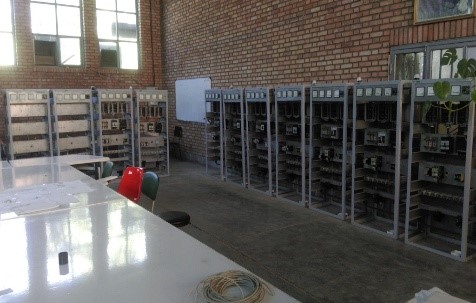
Panel and installation workshop
(Niches No. 1, Electrical Group)
This workshop has been operating for more than thirty years. In this unit, students are introduced to the basic principles of electrical panel design at various voltage levels, and in the practical unit of this workshop, how to implement panel designs and assemble and set up all types of panels required by the water and electricity industry and other industries are taught. In this workshop, participants can get the information they need in the field of different types of panels.
(Niches No. 1, Electrical Group)
This workshop has been operating for more than thirty years. In this unit, students are introduced to the basic principles of electrical panel design at various voltage levels, and in the practical unit of this workshop, how to implement panel designs and assemble and set up all types of panels required by the water and electricity industry and other industries are taught. In this workshop, participants can get the information they need in the field of different types of panels.
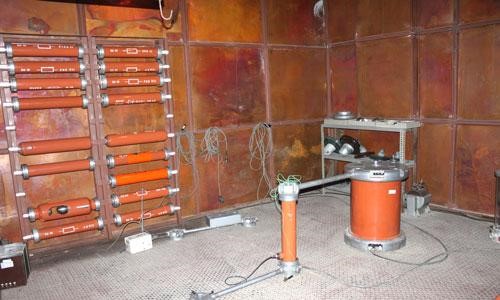
Advanced high-voltage laboratory
(Jabir-ibn-Hayyan building, room 109)
Introduction of laboratory activities (experiments that can be presented):
Tests on high-voltage insulation equipment by applying AC, DC and shock voltages, measuring insulation resistance, measuring insulation loss coefficient (tan(δ)) and partial discharge (PD)
This equipment subject to voltage testing include testing of generators, transformers, panels, etc., on the site, testing of portable equipment in the laboratory, and testing of personal safety equipment, such as safety shoes, safety gloves, insulating carpets, etc.
Testing high- current equipment and measuring their thermal stability, such as cables, power switches, fuses, etc.
(Jabir-ibn-Hayyan building, room 109)
Introduction of laboratory activities (experiments that can be presented):
Tests on high-voltage insulation equipment by applying AC, DC and shock voltages, measuring insulation resistance, measuring insulation loss coefficient (tan(δ)) and partial discharge (PD)
This equipment subject to voltage testing include testing of generators, transformers, panels, etc., on the site, testing of portable equipment in the laboratory, and testing of personal safety equipment, such as safety shoes, safety gloves, insulating carpets, etc.
Testing high- current equipment and measuring their thermal stability, such as cables, power switches, fuses, etc.
Links:

